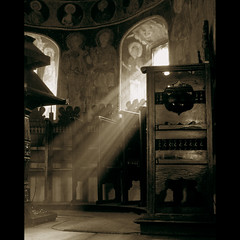There's value in curation
February 27, 2013 in digital music by Dan Gravell

In the ongoing battle between cloud-hosted music streaming and storing your own music, most of the attention is fixed on the obvious benefits of cloud based music: instant access to enormous music libraries, greater convenenience, less of a requirement to store your own music.
These benefits sound powerful, and in many cases most people will find such an approach to music more convenient. But there are a number of subtle side-effects that are less frequently discussed.
Most of these side-effects are rooted in the independence of music from your physical locality. No longer do you purchase the music you want to hear. Instead, in a subscription access model, you purchase generalised access to music. Furthermore, not only is the music no longer distributed on a physical artifact, it's not even located in your house.
Curation and ownership
On most cloud based music services you don't purchase music on an album-by-album or work-by-work basis. The accent towards the instant access model of music distribution, search and play any track in seconds, means it is inpractical to bill the user for each time they play a given song. Indeed, that friction would stop people exploring the music library quite so freely.
Instead, cloud hosted music tends to operate a free tier, where the music is interrupted by advertisements, and then paid tiers free of advertisments where access to the entire library can be purchased on a rolling time period, such as month by month.
Given this approach, can you ever really say you own a music collection now?
You might say sure, but why would I want to own a music library? Fair enough. But not so long ago, a music library was considered a narrative of a person's life. Just as you can look at a person's bookshelf (or Kindle these days!) to learn of their interests, their history and their passions, so to can you look at someone's music collection to learn their eclecticism, their drive, even what their friends may be like (or you can at least try). Looking at your old LPs or CDs stirs memories, good and bad, of the past.
By removing that concept of ownership, we've removed the feeling that we are curators of our own musical journeys.
The album
The medium can sometimes define the message. Arguably the golden age of the popular music album was during the days of the vinyl LP. The LP was a physical artifact that required a modicum of effort to play and it could only be played in full, beginning to end.
This enforced the concept of the album. As a listener you had to listen to the entire thing. Whilst, in theory, changing the record or moving the needle doesn't require too much effort, one's lizard brain nudges you to listen to the whole album, including the "one for the album" tracks (we all know some examples!). But by listening to the entire album you would understand the release as greater than the sum of its parts. Variances in style and tone were evident, and the narrative, defined by the lyrics, would develop through the album. From here, for instance, the concept album was born.
The CD, while still a physical item, did add in random access, which meant it was possible to easily skip tracks. It also saw the advent of the shuffle button. While many great albums continued to be released on CD, the new affordances offered by the skip and shuffle buttons we one step toward dissuading the album as an art form.
With the advent of cloud hosted music we now have non-physical, random access music that can be changed, skipped, and replaced with any other release without even getting out of your armchair. This is another step toward The Shallows. The loss of the former physical constraints that begat the album art form may mean the reason to work on an album at all becomes less relevant to artists.
It's unlikely that the album will die out totally because the cultural resonance remains; bands still want to record proper long-players. But the trend appears to be going only one way.
As I said previously, the concerns raised here are probably not a huge issue for most people wanting to simply listen to some music. I think, in general, cloud hosted music will win the battle for the mainstream, and new ways of interaction will develop which enable more subtle constructs such as 'curation' and concepts similar to 'albums' over time.
Thanks to fusion-of-horizons for the image above.

